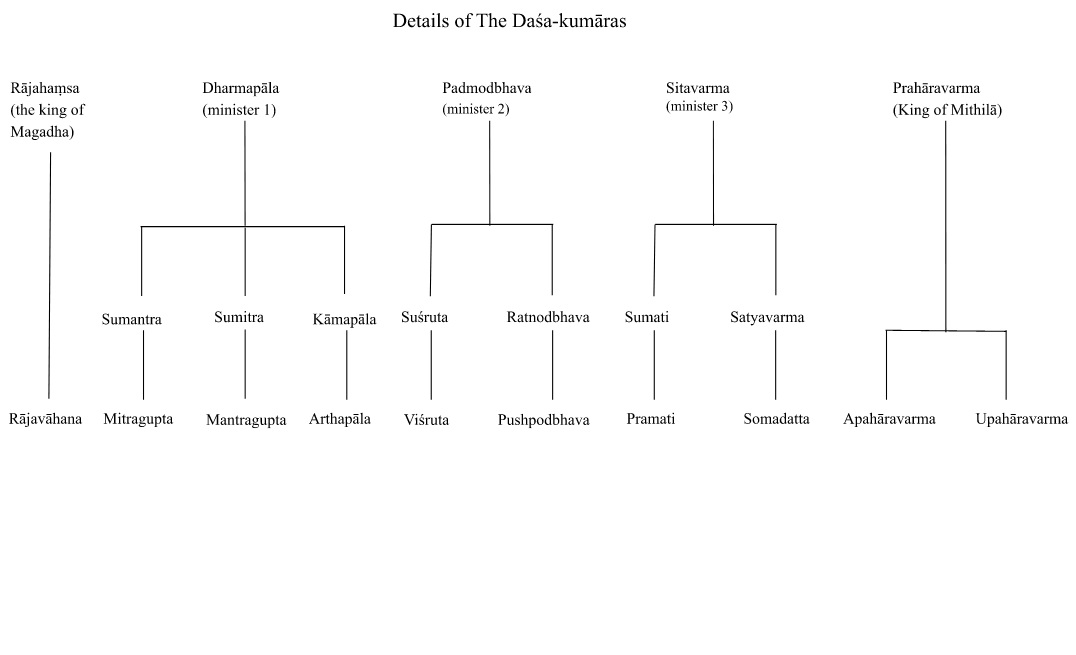Chapter 1
King Rājahaṃsa ruled over the kingdom of Magadha, from the capital city of Puṣpapurī. His queen was Vasumatī. He had three ministers named Dharmapāla, Padmodbhava, and Sitavarmā.
Dharmapāla had three sons - Sumantra, Sumitra and Kāmapāla.
Padmodbhava had two sons - Suśruta and Ratnodbhava.
Sitavarmā had two sons - Sumati and Satyavarma.
Kāmapāla, Ratnodbhava, and Satyavarmā became interested in arts, commerce and spirituality respectively, and travelled abroad. The others became ministers after their fathers retired.
As time passed, a war ensued between Rājahaṃsa and the Mālava king Mānasāra. Although Mānasāra was initially quelled, he persisted and subsequently through the grace of lord Mahākāla, wrested the kingdom and began to rule from Puṣpapurī. Rājahaṃsa and his ministers had to move to the Vindhyā forests.
Rājahaṃsa had a son named Rājavāhana (1).
Sumati, Sumantra, Sumitra, and Suśruta had sons named (2) Pramati (3) Mitragupta (4) Mantragupta and (5) Viśruta respectively.
They joined hands with (6) Upahāravarma (7) Apahāravarma, the sons of the king Prahāravarma of Mithilā.
Along with them joined (8) Pushpodbhava, the son of Ratnodbhava, (9) Arthapāla, the son of Kāmapāla and (10) Somadatta, the son of Satyavarma.
After tiding over many difficulties, all these young men finally reached Puṣpapurī and joined prince Rājavāhana. These were the Daśakumāras.
Chapter 2
Aided by his companions, Rājavāhana embarked upon his conquest. In the region of the Vindhyas, he met Mataṅga and went to the nether world with him. Rājavāhana’s friends lost sight of him and soon they were all separated. Eventually, Rājavāhana returned from the nether-world and reached Ujjayinī. There, near a garden, he met Somadatta.
Chapter 3
The Story of Somadatta:-
Somadatta had come to possess a jewel by happenstance. Out of kindness though, he gifted it away to a poor brāhmaṇa. A little while later, a few royal guards dragged in the brāhmaṇa with his hands tied behind his back. The poor man showed Somadatta to them and said it was he who gave him the jewel. The guards let the brāhmaṇa go and immediately arrested Somadatta.
Somadatta now found himself imprisoned with a few other people. They were the men of Mānapāla, the minister of king Vīraketu. As they began to talk, he became aware that their king had been defeated by Mattakāla, the unruly king of Lāṭa, who had then taken away Vimalalocanā, the daughter of Viraketu. The loyal men of Mānapāla had tracked the camp where Mattakāla’s army was stationed on its way back to Lāṭa. They had then dug up a tunnel to launch a surprise attack and slay Mattakāla. However when they had broken into the enemy camp, they came to know that Mattakāla was away on a hunt. Hence they plundered the cantonment and returned after having gathered everything they could lay their hands on. Later, Mattakāla’s army struck and snatched back the plunder and imprisoned them all. In the treasure that was retrieved, Mattakāla’s men found that one jewel had been missing. It had fallen down along the way, and had fortuitously come to the hands of Somadatta.
It was this same jewel that he had given to the brāhmaṇa. Therefore Somadatta was also thrown into prison. There, he inspired all the other warriors who were in jail with him, to rise up in arms. The next day, he fought a fierce battle with Mattakāla and killed him. Now a relieved man, king Vīraketu was only too happy to give his beautiful daughter Vimalalocanā in marriage to Somadatta, and even declared him his heir. Just as Somadatta finished narrating all this to Rājavāhana, Puṣpodbhava arrived there.
To be continued...
The translation has been rendered by Raghavendra G S, Arjun Bharadwaj, Srishan Thirumalai, and Hari Ravikumar. The original Kannada version of Kathāmṛta is available for free online reading. So are the other works of Prof. Krishnasastri









































